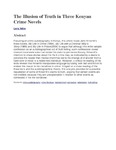The Illusion of Truth in Three Kenyan Crime Novels
Abstract
Focusing on crime autobiography in Kenya, this article reads John Kiriamiti’s three novels, My Life in Crime (1984), My Life with a Criminal: Milly’s Story (1989) and My Life in Prison (2004) to argue that although the writer adopts confession as an autobiographical act of truth telling, such confessions reveal inherent inconsistencies that render his claim to penitence illusory. Kiriamiti’s intention to share stories about his life in crime may be motivated by a desire to convince the reader that imprisonment has led to his change of character from a hard-core criminal to a redeemed individual. However, a critical re-reading of his texts reveals that Kiriamiti manipulates language by fusing both fact and fiction to endear the reader to his narratives in crime. Hinged on a close reading of the three texts and the autobiographical theory, this analysis provides for a possible repudiation of some of Kiriamiti’s claims to truth, arguing that certain events are not credible because they are unexplainable in relation to other events as confessed in his life narratives.
URI
https://www.tandfonline.com/doi/abs/10.1080/23277408.2016.1158543http://ir.mksu.ac.ke/handle/123456780/2068

